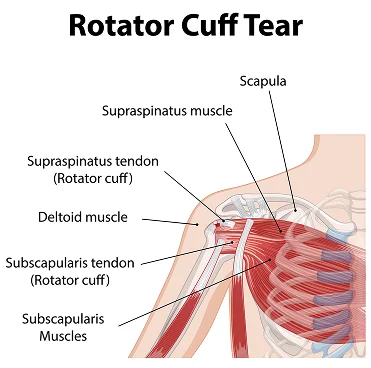The shoulder is one of the most mobile joints in the human body, allowing us to lift, throw, reach, and rotate with ease.
But this freedom of movement comes with a trade-off: the shoulder is also highly vulnerable to injuries, particularly in the rotator cuff.
For active adults whether you are into sports, fitness, or simply love staying active rotator cuff injuries can feel like a major roadblock.
The good news?
With the right preventive measures and recovery strategies, you can protect your shoulders and bounce back stronger.
What is the Rotator Cuff?
The rotator cuff is a group of four muscles and tendons that stabilize your shoulder joint and help with lifting and rotating the arm. When these tendons are strained, torn, or inflamed, it leads to pain, weakness, and limited motion.
Common causes of rotator cuff injuries include:
- Repetitive overhead movements (tennis, swimming, painting, lifting weights)
- Sudden trauma (a fall or accident)
- Age-related wear and tear
Signs of a Rotator Cuff Injury
Knowing the warning signs early can help you take action before the problem worsens:
- Persistent pain in the shoulder, especially at night\
- Difficulty lifting or rotating your arm
- Weakness when performing daily activities
- Clicking or popping sounds in the joint
If symptoms last more than a few days, consult a healthcare professional for proper diagnosis.
Preventing Rotator Cuff Injuries
Prevention is always better than cure. Here are some strategies to keep your shoulders strong and injury-free:
1. Warm Up Before Activity
Dynamic stretches and light movements increase blood flow and prepare muscles for exercise.
2. Strengthen Supporting Muscles
Incorporate shoulder-strengthening exercises such as external rotations, lateral raises, and resistance band work. Strong muscles reduce strain on the rotator cuff.
3. Improve Flexibility
Regular stretching of the chest, back, and shoulders enhances mobility and balance in the joint.
4. Mind Your Posture
Poor posture places unnecessary stress on the shoulder. Keep your back straight and shoulders aligned during daily activities.
5. Avoid Overuse
Rest is just as important as activity. Vary your workouts and give your shoulders time to recover.

Recovery from a Rotator Cuff Injury
If you’ve already experienced a rotator cuff injury, recovery takes patience and consistency.
- Rest and Ice: Allow time for the shoulder to heal and use ice packs to reduce swelling.
- Physical Therapy: Targeted exercises under professional guidance rebuild strength and flexibility.
- Pain Management: Over-the-counter medications or prescribed treatments may help reduce discomfort.
- Gradual Return to Activity: Start with light movements before progressing to more demanding exercises.
- Surgery (in Severe Cases): Some large tears may require surgical repair, though most mild to moderate injuries recover without it.
Key Exercises for Recovery
- Pendulum Swings: Gentle circular shoulder movements to maintain mobility.
- Wall Angels: Strengthen upper back and shoulder muscles while improving posture.
- Resistance Band Rotations: Build rotator cuff strength safely.
Always consult a physiotherapist before starting exercises after an injury.
Rotator cuff injuries can interrupt your active lifestyle, but they don’t have to put you on the sidelines permanently.
By practicing prevention, listening to your body, and committing to proper recovery, you can protect your shoulders and keep moving with confidence.
If you have any trouble with or Rotator Cuff Injury, do consult Orthomed Clinic Bangalore.






